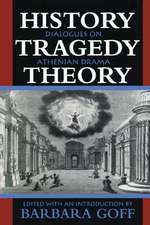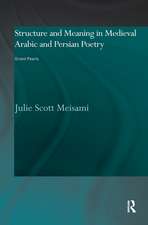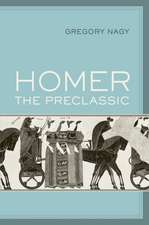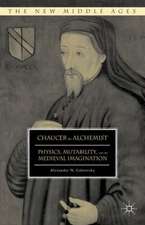Andreas Capellanus on Love?: Desire, Seduction, and Subversion in a Twelfth-Century Latin Text: Arthurian and Courtly Cultures
Autor K. Andersen-Wymanen Limba Engleză Hardback – 11 mar 2008
| Toate formatele și edițiile | Preț | Express |
|---|---|---|
| Paperback (1) | 384.70 lei 6-8 săpt. | |
| Palgrave Macmillan US – 11 mar 2008 | 384.70 lei 6-8 săpt. | |
| Hardback (1) | 389.31 lei 6-8 săpt. | |
| Palgrave Macmillan US – 11 mar 2008 | 389.31 lei 6-8 săpt. |
Din seria Arthurian and Courtly Cultures
- 15%
 Preț: 638.24 lei
Preț: 638.24 lei -
 Preț: 387.75 lei
Preț: 387.75 lei -
 Preț: 385.62 lei
Preț: 385.62 lei - 15%
 Preț: 581.98 lei
Preț: 581.98 lei -
 Preț: 392.60 lei
Preț: 392.60 lei - 18%
 Preț: 774.66 lei
Preț: 774.66 lei -
 Preț: 388.13 lei
Preț: 388.13 lei - 15%
 Preț: 640.06 lei
Preț: 640.06 lei -
 Preț: 386.99 lei
Preț: 386.99 lei - 15%
 Preț: 640.88 lei
Preț: 640.88 lei -
 Preț: 384.86 lei
Preț: 384.86 lei - 15%
 Preț: 645.28 lei
Preț: 645.28 lei - 15%
 Preț: 640.24 lei
Preț: 640.24 lei -
 Preț: 388.72 lei
Preț: 388.72 lei -
 Preț: 388.34 lei
Preț: 388.34 lei -
 Preț: 388.13 lei
Preț: 388.13 lei -
 Preț: 385.47 lei
Preț: 385.47 lei -
 Preț: 390.63 lei
Preț: 390.63 lei
Preț: 389.31 lei
Nou
Puncte Express: 584
Preț estimativ în valută:
74.50€ • 77.50$ • 61.51£
74.50€ • 77.50$ • 61.51£
Carte tipărită la comandă
Livrare economică 15-29 aprilie
Preluare comenzi: 021 569.72.76
Specificații
ISBN-13: 9781403967701
ISBN-10: 1403967709
Pagini: 288
Ilustrații: XI, 273 p.
Dimensiuni: 140 x 216 x 21 mm
Greutate: 0.45 kg
Ediția:2007
Editura: Palgrave Macmillan US
Colecția Palgrave Macmillan
Seria Arthurian and Courtly Cultures
Locul publicării:New York, United States
ISBN-10: 1403967709
Pagini: 288
Ilustrații: XI, 273 p.
Dimensiuni: 140 x 216 x 21 mm
Greutate: 0.45 kg
Ediția:2007
Editura: Palgrave Macmillan US
Colecția Palgrave Macmillan
Seria Arthurian and Courtly Cultures
Locul publicării:New York, United States
Cuprins
Fish or Fowl (or Is There a Genre in This Text?) Repetition in Andreas's Text On Clerical Intertexts and the Subversion of Seduction Andreas and Walter Andreas on Women
Recenzii
'This fascinating rereading of the De amore of Andreas Capellanus within a twelfth-century context uncovers his subversive approach to class, gender (specifically, heterosexuality), religion, and the individual. In her deft, clever examination, Andersen-Wyman sees what other readers have not, thereby explaining the reason for the book's condemnation by Bishop Tempier. Only superficially about the seduction of women, De amore reveals Andreas's view of the subjectivity and relativity of argument and evidence and his general condemnation of judgment. By raising female voices in dialogue, Andreas exonerates women and counters oppressive institutions. An important new book.' - Jane Chance, Rice University
'In her study of this perennially baffling text, Andersen-Wyman does far more than clear up its difficulties and make lucid its surprising project. By reorienting the book's archive toward contemporary ecclesiastical Latin discourses on love, desire, friendship and sexuality, she expands our view well beyond he the arena of vernacular courtly literature that has dominated readings of Andreas, and gives us the picture of a period passionately engaged in debating these issues with the human seriousness the joy, pain and exaltation they deserve. Driven by deep learning and critical acumen in its overall argument, the book is ornamented by a flashing wit, often of bracing tartness, in its particular observations. Andreas Capellanus on Love is worthy of its subject: powerful, funny and smart. It is the best book in medieval studies that I have read in a long time.' - H. Marshall Leicester, Jr., University of California, Santa Cruz
'Finally, here is a most intelligent and thoughtful, truly sensitive and best informed study on the highly complex, mysteriously contradictory treatise by Andreas Capellanus, De amore. Andersen -Wyman's book cuts through much of traditional scholarship on this text and offers an intriguing, absolutely convincing analysis, suggesting that Andreas's text served multiple purposes, mostly of relevance for medieval intellectuals, but not really for courtly lovers, a convenient screen to hide the true intentions. De amore suddenly emerges as a thoroughly satirical text predicated on numerous discourses aiming for epistemological enlightenment and drawing on intensive intertextual connections. In fact, Andreas simply played with misogynous rhetoric and certainly embraced homosexuality in his relationship with Walter. Andersen-Wyman's investigation will be the hallmark of future research on De amore.' - Albrecht Classen, University of Arizona, Tucson
'In her study of this perennially baffling text, Andersen-Wyman does far more than clear up its difficulties and make lucid its surprising project. By reorienting the book's archive toward contemporary ecclesiastical Latin discourses on love, desire, friendship and sexuality, she expands our view well beyond he the arena of vernacular courtly literature that has dominated readings of Andreas, and gives us the picture of a period passionately engaged in debating these issues with the human seriousness the joy, pain and exaltation they deserve. Driven by deep learning and critical acumen in its overall argument, the book is ornamented by a flashing wit, often of bracing tartness, in its particular observations. Andreas Capellanus on Love is worthy of its subject: powerful, funny and smart. It is the best book in medieval studies that I have read in a long time.' - H. Marshall Leicester, Jr., University of California, Santa Cruz
'Finally, here is a most intelligent and thoughtful, truly sensitive and best informed study on the highly complex, mysteriously contradictory treatise by Andreas Capellanus, De amore. Andersen -Wyman's book cuts through much of traditional scholarship on this text and offers an intriguing, absolutely convincing analysis, suggesting that Andreas's text served multiple purposes, mostly of relevance for medieval intellectuals, but not really for courtly lovers, a convenient screen to hide the true intentions. De amore suddenly emerges as a thoroughly satirical text predicated on numerous discourses aiming for epistemological enlightenment and drawing on intensive intertextual connections. In fact, Andreas simply played with misogynous rhetoric and certainly embraced homosexuality in his relationship with Walter. Andersen-Wyman's investigation will be the hallmark of future research on De amore.' - Albrecht Classen, University of Arizona, Tucson
Notă biografică
KATHLEEN ANDERSEN-WYMAN is Assistant Professor of English and Humanities at Brazosport College, USA.
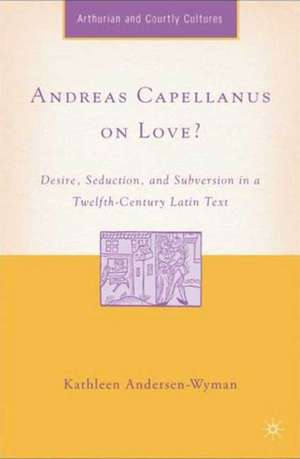

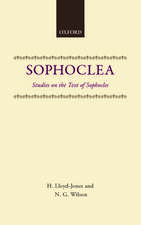

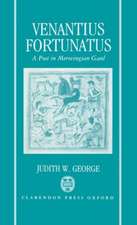

![The [European] Other in Medieval Arabic Literature and Culture: Ninth-Twelfth Century AD](https://i0.books-express.ro/bt/9780230109407/the-european-other-in-medieval-arabic-literature-and-culture.jpg)

